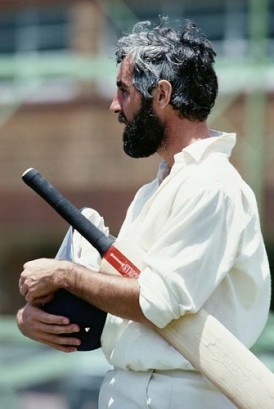Gareth Bland | 6:05am BST 01 June 2024

He was all the time regarded as high-minded, and even Rodney Hogg famously asserted that he “had a level in individuals”, however Mike Brearley’s profession outdoors cricket is maybe singularly distinctive within the trendy age. It was in 2013 that he delivered a lecture at The College of Glasgow that embraced every side of his skilled existence. Making use of the Socratic technique of questioning to his chosen topic, Brearley delivered an deal with to commemorate the fiftieth anniversary of the publication of C.L.R. James’ seminal Past a Boundary.
Having retired from all cricket on the finish of the 1982 English season, Brearley opted to maneuver full-time to the lifetime of the thoughts and the occupation of psychoanalysis. As an undergraduate Brearley had learn Classics and Ethical Sciences at St Johns’s School, Cambridge, and subsequently embarked upon a lectureship in Philosophy at Newcastle College, a activity which he mixed with taking part in cricket for Middlesex. As his skilled cricket profession neared its finish, although, Brearley started to coach in psychoanalysis in preparation for his life past the sport.
The context of C.L.R James’s work – that of a Trinidadian-born mental and historian tracing his love of the sport whereas concurrently being the topic of colonial rule – was, and is, doubly important given Brearley’s observations of sophistication variations within the English home recreation. James’ work was printed in the identical 12 months, 1963, wherein the final Gentleman v. Gamers recreation was performed. Coming a 12 months earlier than Brearley obtained his county cap from Middlesex, the English recreation’s home model of cricketing apartheid was changing into a drained anachronism. In 1961, on the Scarborough Pageant the place a Gentleman v. Gamers fixture was in full swing, a younger Brearley, simply 18, had turned up on the eating desk sans the compulsory dinner jacket. Later, forward of the ultimate recreation of its type Brearley had dismissed the notion of the fixture as being one for “previous colonels”.
Brearley’s topic, C.L.R. James, was all too conscious of the contradictions inherent in his fixation with a recreation which was a colonial implant. Such conflicts have been evident even in his alternative of staff. As the educational Paul C. Hebert wrote in his evaluate of Past a Boundary:
For James, selecting a staff to play for required navigating a posh system of overlapping social buildings wherein individuals sought to keep up no matter benefit their pores and skin color or class place gave them. White groups like Queen’s Park and Shamrock wouldn’t settle for James due to his race, taking part in for Stingo, the staff of “the plebeians, the butcher, the tailor, the candlestick maker, the informal labourer, with a sprinkling of the unemployed” was not an choice as a result of it represented a step down for a middle-class man like James. Of the remaining prospects–Maple, a staff made up of “the brown-skinned center class,” the place members tried to safeguard the social benefits of a lighter complexion, and Shannon, “the staff of the black lower-middle class”–James selected Maple, a call, that “delayed [his] political improvement for years” by additional isolating him from the favored lots.
Though James had authored the pamphlet The Case for West-Indian Self Authorities in 1936, he had additionally devoured, with relish, the Western literary and philosophical canon from a younger age. Talking to an African-American scholar he mentioned of himself “I’m a Black European, that’s my coaching and outlook”.
For the cricketer turned thinker turned psychoanalyst Brearley, his personal contradictions have been obvious and have been additionally evident to the person himself. Requested concerning the antipathy which Australians crowds had displayed in direction of him through the 1979/80 England tour, Brearley professed that “within the externals” equivalent to accent and college background he represented “the form of Englishman that they (the Australians crowds) have been very suspicious of”. Nevertheless, as Ian Botham’s biographer Simon Wilde had famous, Brearley was a way more layered persona when it got here to his English teammates. Wilde wrote:
“He (Brearley) was nicely grounded and pragmatic – he was a doer in addition to a thinker. His antecedents have been removed from grand and – maybe helpfully so far as Botham was involved – from the North. His grandfather, who got here from Heckmondwike in Yorkshire, had been an engine-fitter in addition to a vigorous quick bowler; his father Horace, whereas sustaining the household ardour for cricket as a batsman, grew to become a trainer in Sheffield after which in London. Brearley himself appeared happiest surrounded by hard-headed Northern cricketers equivalent to Hendrick, Miller, Randall, Willey, Boycott, Taylor, and (if household origins rely) Botham, whereas one of many few gamers with whom he did not hit it off was Phil Edmonds, born in Zambia and each bit the bolshie colonial.”
This exact same independence of thoughts and initially of thought was evident to the journalist Paul Edwards, who, in a The Cricket Month-to-month interview, noticed of Brearley “He’s suspicious of the British institution but additionally dislikes north-west London and Guardian-reading conformity. Kerry Packer was by no means his model, but he understood the motivations of the cricketers who joined World Sequence Cricket and he was insistent they be picked on advantage for the England staff he captained in 1977“.
The power to grasp contradictory poses and ideas is maybe inherent in Brearley’s coaching and mindset. It’s also central to the Socratic technique with which Brearley had utilized to his topic C.L.R. James. Basically, a method which fosters self-discovery, because it entails in-depth questioning and dialogue, the Socratic technique in flip can reveal a better depth of self-awareness and understanding, and even tease out and recognize a topic’s personal inherent contradictions. Simply as Brearley was in a position to observe the injustices of apartheid when touring South Africa in 1964/5 and be vocal concerning the therapy meted out to Basil D’Oliveira by the England selectors in 1968/69, and take ethical stances on each, so Brearley was in a position to insist that his personal Packer-bound England teammates must be picked on advantage.
The favored picture of Brearley is of English cricket’s gray eminence, definitely when contemplating his mental prowess and profession post-cricket, alongside his literary output and manner as captain. As Jonathan Calder remarked in his Liberal England weblog, “When Brearley grew to become England’s captain in 1977 it was nearly as if Jonathan Miller or Michael Frayn had been put in cost. Brearley was a consultant of liberal North London in an age when cricket was nonetheless run by the institution.” How ironic, then, that Mike Brearley’s most interesting cricketing hour must be synonymous with a person, in Ian Botham, whose political outlook is the very antitheses of North London’s cultural institution.














